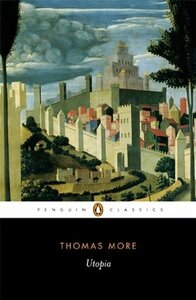Take a photo of a barcode or cover
informative
reflective
fast-paced
Plot or Character Driven:
Plot
Strong character development:
No
Loveable characters:
Complicated
Diverse cast of characters:
No
Flaws of characters a main focus:
No
I need to not have pre-conceived notions about books before I read them. For some reason, I thought this was a more contemporary book. I knew that this book was what a lot of dystopian books are influenced by, but I didn't realize it was written in the 16th century!
The framing device More employed confused me for the first part of the book, but when once I got into the meat of the argument, I promptly forgot the outer frame.
Like most people who have read a lot of science fiction, I was at first mistrusting of the claims Raphael made of the island. But as I read more and more, the island sounds like a fantastic place to live. Only 6 hours of work a day, lots of time to pursuit intellectual pleasures, never going hungry, and religious toleration? Sign me up!
There were only two bits about the book that I had trouble with. The Utopians regard killing animals and butchering animals dirty, beneath them, and dehumanizing -- which is why they get slaves to do it for them. With their capacity for reasoning and their penchant for farming and hard work, I'd think that the whole society would decide to become vegetarians.
The second part was how easily and quickly the Utopians adopted Christianity. For the most part, they seem to be self sufficient and pleased with their own thinking, which was why I was surprised how quickly they embraced Christianity. More explains it was because the core beliefs of Christianity so closely resembled Utopian religions, but I was still skeptical that it was More asserting his belief or placating his readers. In the 16th century, maybe people felt more nervous reading a book about distant men who were so superior but not Christian. At least he put in the bit about religious toleration.
For someone who likes dystopian novels, I'm glad I finally sat down and read Utopia. It certainly gives a different perspective to not having private property and living in a somewhat communist society. Sure, it's very idealized, but at the end of the book, I was convinced if I could find a country like that, I'd be pretty happy living there.
The framing device More employed confused me for the first part of the book, but when once I got into the meat of the argument, I promptly forgot the outer frame.
Like most people who have read a lot of science fiction, I was at first mistrusting of the claims Raphael made of the island. But as I read more and more, the island sounds like a fantastic place to live. Only 6 hours of work a day, lots of time to pursuit intellectual pleasures, never going hungry, and religious toleration? Sign me up!
There were only two bits about the book that I had trouble with. The Utopians regard killing animals and butchering animals dirty, beneath them, and dehumanizing -- which is why they get slaves to do it for them. With their capacity for reasoning and their penchant for farming and hard work, I'd think that the whole society would decide to become vegetarians.
The second part was how easily and quickly the Utopians adopted Christianity. For the most part, they seem to be self sufficient and pleased with their own thinking, which was why I was surprised how quickly they embraced Christianity. More explains it was because the core beliefs of Christianity so closely resembled Utopian religions, but I was still skeptical that it was More asserting his belief or placating his readers. In the 16th century, maybe people felt more nervous reading a book about distant men who were so superior but not Christian. At least he put in the bit about religious toleration.
For someone who likes dystopian novels, I'm glad I finally sat down and read Utopia. It certainly gives a different perspective to not having private property and living in a somewhat communist society. Sure, it's very idealized, but at the end of the book, I was convinced if I could find a country like that, I'd be pretty happy living there.
informative
reflective
adventurous
challenging
informative
fast-paced
Plot or Character Driven:
A mix
Strong character development:
N/A
Loveable characters:
N/A
Diverse cast of characters:
No
Flaws of characters a main focus:
Complicated
reflective
slow-paced
Plot or Character Driven:
N/A
Strong character development:
No
Loveable characters:
No
Diverse cast of characters:
No
Flaws of characters a main focus:
No
The problem with reading a book called "Utopia" is that the reader feels compelled while reading to constantly poke holes in the writer's idealism. We're a bunch of cynics, aren't we, living in our dystopic world, where dystopian fiction has flooded the market to the point where publishers won't touch it with a ten-foot pole anymore if it isn't authored by an Atwood or an Orwell. But when was the last time you read a utopian novel that wasn't actually describing a dystopia in disguise? Utopia, it turns out, means "no place." It doesn't actually exist.
I found this to be a fairly quick and interesting read, especially considering the 1515 publishing date. Taken in the context of its time, with Europe taking tentative steps away from feudalism, I found it fascinating to glimpse flashes of the modern world in some guy's idealistic political mashup fever dream (or is it?), which alternates between "wow, that's so modern!" and "I'll pass on the religious patriarchy, thanks." My favorite part was the discussion of prison reform, although it seems the dialogue has changed little in 500 years. Hey, maybe most crime is caused not by evil people, but by social pressures! Maybe the death penalty isn't an effective deterrent! (wake me up in another 500 years and let me know if any conclusions have been reached).
Thomas More's other conclusion that really needs more traction, in my opinion, is the attitude that places reading books on the same "usefulness to society" level as, say, gardening or tinkering on your car. Just because a hobby has no visible product--a few jars of tomatoes for winter or a "free" oil change, doesn't mean it's a waste of time. If you choose to read this summer instead of killing a batch of peppers, raspberries, and a third of your lawn (that would be me), you still have a place in More's utopia...you just have to find it first.
I found this to be a fairly quick and interesting read, especially considering the 1515 publishing date. Taken in the context of its time, with Europe taking tentative steps away from feudalism, I found it fascinating to glimpse flashes of the modern world in some guy's idealistic political mashup fever dream (or is it?), which alternates between "wow, that's so modern!" and "I'll pass on the religious patriarchy, thanks." My favorite part was the discussion of prison reform, although it seems the dialogue has changed little in 500 years. Hey, maybe most crime is caused not by evil people, but by social pressures! Maybe the death penalty isn't an effective deterrent! (wake me up in another 500 years and let me know if any conclusions have been reached).
Thomas More's other conclusion that really needs more traction, in my opinion, is the attitude that places reading books on the same "usefulness to society" level as, say, gardening or tinkering on your car. Just because a hobby has no visible product--a few jars of tomatoes for winter or a "free" oil change, doesn't mean it's a waste of time. If you choose to read this summer instead of killing a batch of peppers, raspberries, and a third of your lawn (that would be me), you still have a place in More's utopia...you just have to find it first.
adventurous
challenging
informative
lighthearted
reflective
slow-paced
Plot or Character Driven:
N/A
Strong character development:
N/A
Loveable characters:
N/A
Diverse cast of characters:
N/A
Flaws of characters a main focus:
N/A
i tried to read this, really could not get into it. tried listening to an audio book version of it but its so dry that i cant handle reading this at all. maybe this is too deep for me to understand but i really got lost heaps.
reflective
slow-paced


